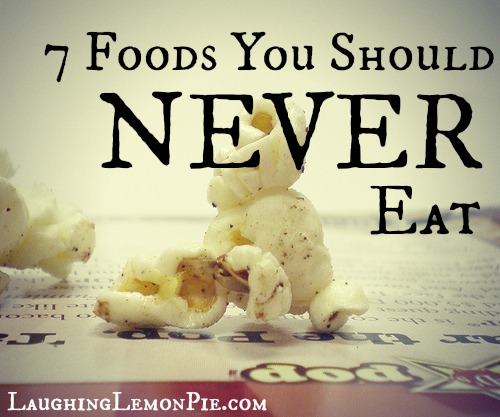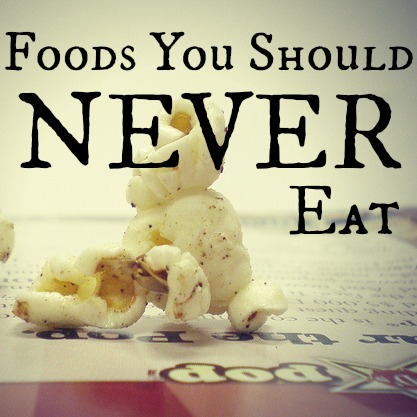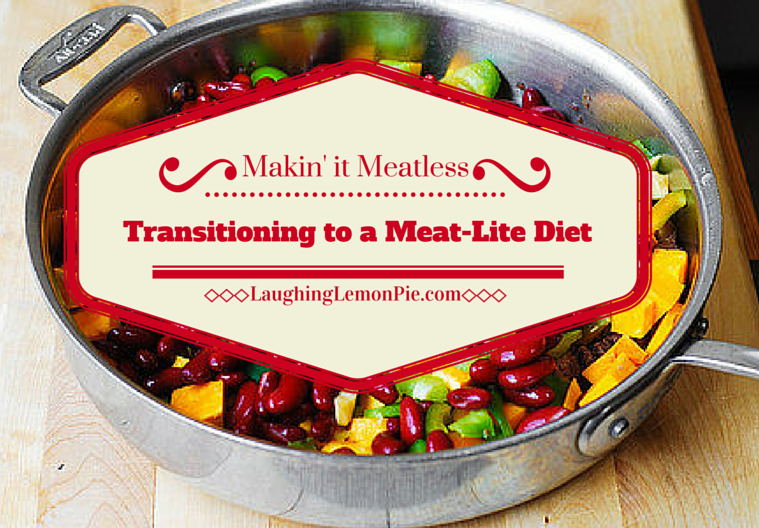It’s a sad truth that sometimes even foods that seem healthy can be bad for our health and our planet. Here are seven foods you should never eat—and easy ways to swap them out and get them out of your life.
7 Foods You Should Never Eat:

1. Conventional Apples
You’ll know this one if you’ve seen the “dirty dozen” list. Conventionally grown apples are sprayed with a ton of pesticides because they don’t develop any natural pest resistance because of the way they’re grown. Even farm workers who have been exposed to these pesticides have higher incidents of cancer, and more and more studies are linking pesticides like the ones on these apples to Parkinson’s disease.
Swap it up: Buy organic apples! If you can’t afford organic, be sure to wash and peel apples before eating (although that won’t rid the fruit of all pesticides).
2. Conventionally Grown Potatoes
Think about it: A potato is a root vegetable, and plants absorb nutrients—and other junk—from the soil through their roots. Conventionally grown potatoes take up and store a lot of the chemical fertilizers, fungicides and pesticides that the farmers spray on the crop. And then, after they’re harvested, they’re treated with another chemical to prevent them from sprouting on the shelf. Just scrubbing or even peeling won’t remove the pesticides and other chemicals.
Swap it up: Buy organic potatoes—even frozen ones.
3. Corn-Fed Beef
So, the problems with corn-fed beef start with the corn: cows evolved to eat grasses, not grains, and eating corn actually makes them sick. So the farmers dose them with high levels of antibiotics—just to keep them alive. In addition, feeding corn to cows isn’t just bad for the cows, it’s bad for the environment, too. Conventionally grown corn requires tons of chemical fertilizers and pesticides that pollute the environment.
Swap it up: Buy grass-fed beef and enjoy higher levels of good nutrients like omega-3s and vitamin E, and lower levels of bad stuff like inflammatory omega-6s and saturated fat. Look for cheaper cuts on the bone to help offset the premium price for grass-fed beef.
4. Canned Tomatoes
Tomatoes are totally healthy, but the resin used to line tin cans to protect from corrosion by the acid in tomatoes contains BPA ( bisphenol-A), which acts like synthetic estrogen in the body. It’s thought to cause a whole host of problems, like chromosomal and reproductive system abnormalities in babies, impaired brain and neurological functions, cancer, cardiovascular system damage, adult-onset diabetes, early puberty, obesity and resistance to chemotherapy. To make matters worse, the acidity of tomatoes helps break down the BPA which leaches into the food, making canned tomatoes one of the worst offenders when it comes to ingesting BPA. Scientists with the National Institutes of Health have concluded that pregnant women, infants and children are at highest risk from exposure to BPA.
Swap it up: The best solution is to look for brands sold in glass jars or Tetra Pak boxes.
5. Microwave Popcorn
Did you hear about the guy who got popcorn lung from eating more than two bags of microwave popcorn a day? It turns out that even if you’re not eating a dozen bags a day, chemicals in microwave popcorn like perfluorooctanoic acid (PFOA) found in the lining of the bag and diacetyl, which is used in the butter flavoring, could cause major health problems. Microwaving these chemicals causes them to vaporize, and then the miniature particles can make their way into your popcorn and your lungs if you inhale the steam from the bag.
Swap it up: Popping your own kernels the old fashioned way (or with a paper bag in the microwave) is so simple, this one really is a no-brainer. Plus, you’ll be able to add your own seasonings. And as a bonus, unpopped popcorn is REALLY cheap.
6. Milk With rBGH
rBGH stands for recombinant bovine growth hormone, and it’s given to dairy cows to boost their milk production. But, it’s not good for the cows, giving them udder infections and even pus in the milk! (NASTY!) It also increases the amount of a hormone called insulin-like growth factor in the milk. That hormone has been linked to an increased risk for breast cancer, prostate cancer, colon cancer and early puberty.
Swap it up: Look for milk that says rBGH-free or rBST-free, or buy organic milk. You can also make the switch to a non-dairy milk.
7. Farmed Salmon When you think about factory farming, you might think of cows or maybe chickens. But farmed salmon have it just as bad. Farm salmon have to live in inhumanely overcrowded pens and are fed a diet of soy, poultry litter (which means chicken poop) and hydrolyzed chicken feathers—and you are what you eat, after all. They’re also frequently contaminated with all kinds of chemicals from ground run off that gets into the pools where they’re farmed. Plus, waste from the salmon pens is released directly into the open ocean. The Environmental Defense Fund lists farmed salmon as an eco-worst choice.
Swap it up: Look for wild-caught Alaskan salmon. The brand Wild Catch is almost the only brand which sells canned wild salmon.
Original Photo by: TheFoodJunk via Compfight cc





It's amazing where the nasties are in our foods these days. No wonder cancer is on the rise. Thanks for your post.
I know! Simplicity seems to be the key.
Thanks for a great post, Lacy. Not only do we need to make food choices from a nutritional standpoint but from a toxin standpoint, too. Yes, it’s a sad state that we’ve gotten ourselves into but when people vote with their pocketbooks, we can send a message to the manufacturers and suppliers that we aren’t going to buy the crap that they’re selling! If enough people do that, their bottom lines will suffer and either they will ‘get with the program’ or get out of business. Concerned consumers–UNITE!
A good list for people to avoid. Like the way you make suggestions of how to ' swap it up'.
Thanks Dot! Got to include a positive with the negatives.
I was hungry before I read this, but I think I won't eat right now. Thank you for sharing the information. WE all need to know this.
Ha! Sorry to put you off your meal, Arleen!
Never knew about the canned tomato issue. Do you know whether this is also a problem with imported tomatoes? Organic tomatoes from the US? Of only big food coporations' packaging.
Claire, as far as I know it is all tomatoes (domestic and imported) that come in cans. They have to line the cans so the tomato acid doesn't erode the metal, and the BPA is in the lining. Tomatoes in glass jars or in waxed cardboard packaging (like Pomi) are safe as far as I know. There is BPA in all canned food UNLESS it specifically says BPA free, but tomatoes are the worst because the acid makes the chemical leech into the food more quickly.